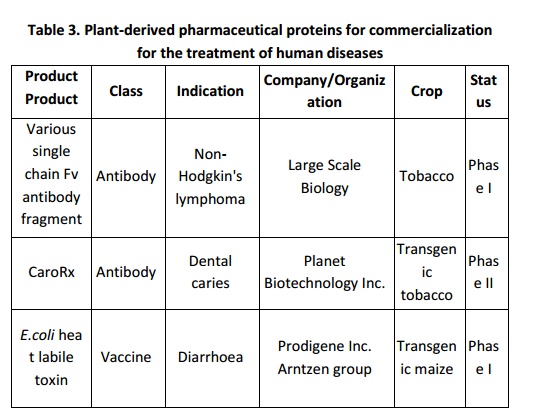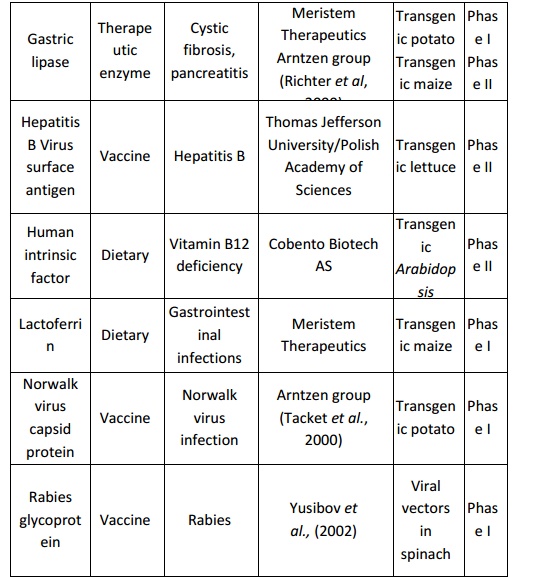Chapter: Basic Concept of Biotechnology : Plant Molecular Farming: A Promising Stratergy in Biotechnology
Plant made pharmaceuticals (PMPs)
Plant made pharmaceuticals (PMPs)
Therapeutic proteins are bioactive molecules that have potential applications in medicinal diagnostics and therapy. Several therapeutic products can be produced in plants which include diagnostic proteins (antibodies and enzymes), replacement proteins (Factor VIII for hemo philiacs, in sulin for diabetics), immune system stimulator/suppressants (interleukins, interferons, and colony stimulating factors), and adhesive proteins for surgical purposes or for growth factors (Daniell et al., 2001b; Goldstein and Thomas, 2004; Rajasekharan, 2006; Twyman et al., 2005). Antibodies or immunoglobulins (IgGs) are serum proteins that play a central role in the humoral immune response and the production of these antibodies in plants are referred as “Plantibodies” (De Jaeger et al., 2000; Goldstein and Thomas, 2004). The production of immunoglobulin fragments and their assembly in plants was reported in tobacco for the first time (Hiatt et al., 1989).
The recombinant antibodies can be produced in plants in many forms which include full size recombinant antibody, chimeric antibody, secretory antibody, single chain Fv fragments (scFvs), scFv fusion, bispecific scFv, antibody fragments or heavy chain variable domains (Ma et al., 2003). Transgenic plants have also been used for the production ofantibodies directed against Dental caries, Rheumatoid arthritis, Cholera, Diarrhoea, Malaria, certain cancers, Norwalk virus, HIV, Rhinovirus, Influenza, Hepatitis B virus, and Herpes simplex virus (Thomas et al., 2002). Commercialization of plant-derived pharmaceutical proteins for the treatment of human diseases is given in table 3.


Human glucocerebrosidase (hGC) is required for enzyme replacement therapy was produced in tobacco and in transgenic carrot cells by Protalix Biotherapeutics. Human somatotropin (hST) which is used to treat hypopituitary dwarfism in children, turner syndrome andchronic renal failure, was produced in tobacco chloroplasts and proteins accumulated up to 7% of TSP (Staub et al., 2000). An artificial substitute for human breast milk with the bioactive proteins, a synthetic human lactoferrin (HLF) was produced in rice and the transgenic rice plants showed HLF accumulation 0.5% in dehusked rice grain (Nandi et al., 2002). Plants have the potential to produce large amounts of mAbs, with low production costs, the ability to be rapidly scaled up to meet market demand and reduced risk of contamination with human and animal pathogens (Fischer et al., 2003; Teli and Timko, 2004). Other crop plants like potatoes, alfalfa and rice have also been used to produce antibodies (Goldstein and Thomas, 2004).
Related Topics